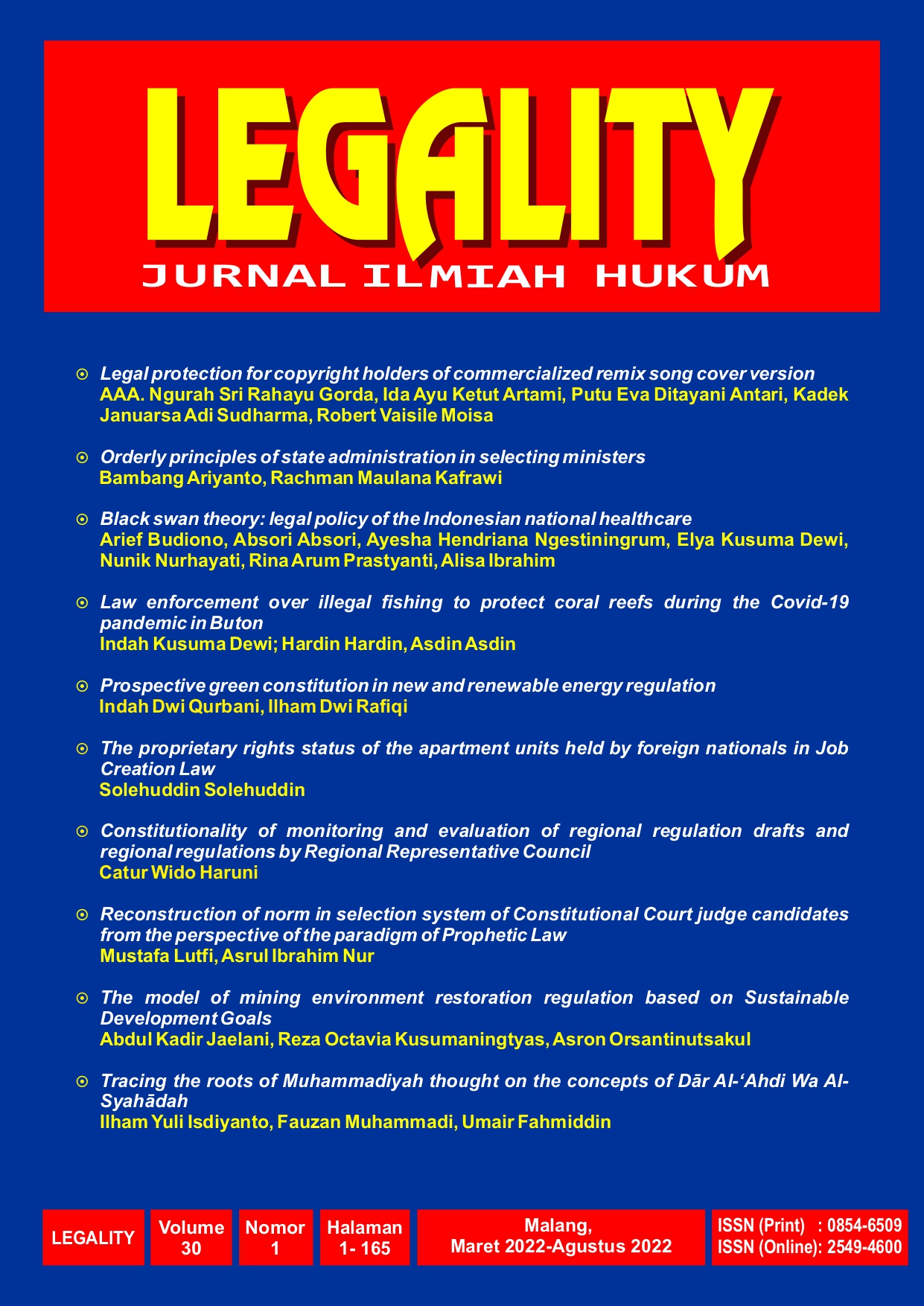Black swan theory: legal policy of the Indonesian national healthcare
DOI:
https://doi.org/10.22219/ljih.v30i1.16867Keywords:
Black Swan, Theory, Health, Service, IndonesiaAbstract
The Indonesian National Health Service (NHS) is part of Indonesia’s national social security system. Its implementation is full of problems, such as the rejection of patients, the NHS payment which is lower than the real health cost, sanctions, fines, etc. The Indonesian National Social Security System, especially the NHS services, was established by the state to give social protection to its citizens. The Black Swan Theory is based on the presumption that all swans are white, thus in this case, the Indonesian NHS is truly a program aimed to give social security in the health sector, just as the general conditions of social securities applied in other countries. This research studies this theory to explore the paradoxes which happen in the Indonesian NHS to find the black swan. In this case, the black swan is a paradoxical symbol regarding the regulations and the problems of the Indonesian NHS. This research uses the juridical-doctrinal or the normative method and is descriptive research with a qualitative approach. Based on the Black Swan theory, this research tries to find paradoxical, extreme, and unpredictable discrepancies in the Indonesian NHS. It is found that the Indonesian NHS is a black swan or unpredicted according to black swan theory. The objectives, practices, and regulations of this NHS are truly different from the NHS which is supposed to be given to the Indonesians. It transfers the government’s burden in establishing the health service and the rights of the citizens to the citizens, coupled with the threat of sanctions which is unknown in NHS. The applied Indonesian NHS has an extensive impact on hundreds of millions of Indonesian citizens.
Downloads
References
Alim, M. (2010). Asas-asas Negara Hukum Modern Dalam Islam (The Principles of Modern Law in Islam). LKIS.
Aurora, W. I. D. (2019). Perbandingan Sistem Kesehatan di Negara Maju dan Negara Berkembang. Jambi Medical Journal, 7(2), 206–214. https://doi.org/10.22437/jmj.v7i2.8030
Awofeso, N., Mohan, A., & Asnaripa, A. (2012). Exploring Indonesia’s “low hospital bed utilization low bed occupancy-high disease burden” paradox. Jurnal Of Hospital Administration, 2(1).
Darmawati, Angkasa, M. P., & Isrofah. (2015). Analisis Faktor yang Mempengaruhi Kepatuhan Perawat Menggunakan Alat Pelindung Diri di RSUD Bendan Kota Pekalongan. Pena Jurnal Ilmu Pengetahuan Dan Teknologi, 28(2), 165–180.
Ekonomi Kompas. (2017). Sepanjang 2016 Pendapatan BPJS Kesehatan Rp. 67,4 triliun (In 2016, the Income of BPJS Health is Rp. 67,4 trilion).
Fitrianeti, D., Waris, L., & Yulianti, A. (2017). Penganggaran dan Penerimaan Dana Kapitasi Program JKN di Daerah Terpencil Kabupaten Kepulauan Mentawai. Jurnal Penelitian Dan Pengembangan Pelayanan Kesehatan, 1(2), 92–101. https://doi.org/10.22435/jpppk.v1i2.8105.92-101
Handayani, L., & Suharmiati, S. (2018). Unit Cost Rumah Sakit dan Tarif INA-CBGS. Buletin Penelitian Sistem Kesehatan, 21(4), 219–227. https://doi.org/10.22435/hsr.v21i4.45
Harvelian, A. (2016). Mahkamah Konstitusi dan Penguatan Kosntitusi Ekonomi Indonesia. Jurnal Konstitusi, 13(3), 530–551. https://doi.org/10.31078/jk1333
Hasrillah, H., Cikusin, Y., & Hayat, H. (2016). Implementasi Pelayanan Kesehatan Masyarakat Melalui Program BPJS Kesehatan (Studi pada Puskesmas Kedungkandang Kota Malang). Jurnal Inovasi Penelitian, 1(12), 2869–2882. https://doi.org/10.47492/jip.v1i12.594
Hidayah, N. P. (2020). Comparative study of legal protection for migrant workers in participation of social security programs in Indonesia and Singapore. Legality Jurnal Ilmiah Hukum, 28(1), 47–59. https://ejournal.umm.ac.id/index.php/legality/article/view/11786/pdf
Irwanto, A., & Razy, F. (2021). Pertanggungjawaban Hukum Dokter Program Internsip dalam Pelayanan Kesehatan Terhadap Pasien. Audito Comparative Law Journal (ACLJ), 2(2), 57–65. https://doi.org/10.22219/aclj.v2i2.16501
Jabbar, L. D. A. A. A. (2020). Pertanggung Jawaban BPJS Kesehatan Terhadap Pelayanan Asuransi Kesehatan Masyarakat. Jurist-Diction Law Journal, 3(2), 387–400.
Kadarisman, M. (2015). Analisis Pelaksanaan Sitem Jaminan Sosial kesehatan Paska Putusan MK Nomor 007/PUU-111/2005 (Analysis of the Health Social Security System Post-Constitutional Court Decree No. 007/PUU-111/2005). Jurnal Hukum Ius Quia Iustum, 22(3).
Karmeli, E. (2008). Krisis Ekonomi Indonesia. Journal of Indonesian Applied Economics, 2(2), 164–173. https://doi.org/10.21776/ub.jiae.2008.002.02.3
Kartikawati, D. R. (2021). Tanggung Jawab Rumah Sakit terhadap Pemenuhan Hak Pasien pada Masa Pandemi COVID-19. Indonesia Law Reform Journal (ILREJ), 1(3), 318–335.
Khakim, A. (2021). Problematika Pengaturan dan Penerapan Sanksi Pidana Atas Pelanggaran Pasal 15 Undang-Undang Nomor 24 Tahun 2011 tentang Badan Penyelenggara Jaminan Sosial. Audito Comparative Law Journal, 2(1), 43–56. https://doi.org/10.22219/aclj.v2i1.15159
Kumparan Bisnis. (2018). Sepanjang 2017 BPJS Kesehatan Catat Pendapatan Iuran Rp. 75, 25 triliun (In 2017, BPJS Health Noted the Due Income of Rp. 75, 25 Trillion).
Mardiah. (2016). Cost Recovery Rate Tarif Rumah Sakit dan Tarif INA-CBG’s Berdasarkan Clinical Pathway pada Penyakit Arteri Koroner di RSUP Dr. Mohammad Hoesin Palembang Tahun 2015 (Cost Recovery Rate of Hospital and INA CBG’s Tariffs based on Clinical Pathway on Coronary. Jurnal Administrasi Rumah Sakit, 2(3).
McLean, E. I., & McMillan, A. (2009). The Concise Oxford Dictionary of Politics. Oxford University Press.
Mudiyono. (2002). Jaminan Sosial di Indonesia: Relevansi Pendekatan Informal. (Social Security in Indonesia: Relevance of the Informal Approach). Jurnal Ilmu Sosial Dan Ilmu Politik, 6(1), 68–69.
Narbuko, N., & Ahmadi, A. (1997). Metodologi Penelitian (Research Methodology). Bumi Aksara.
Niah, N. S. (2016). Pelaksanaan Kebijakan Badan Penyelenggaraan Jaminan Sosial (BPJS) di Kabupaten Jombang. JPAP: Jurnal Penelitian Administrasi Publik, 2(1), 1–32. https://doi.org/10.30996/jpap.v2i01.698
Nopiani, N. (2018). Implementasi Program Pembangunan di Bidang Kesehatan dalam Meningkatkan Kualitas Kesehatan Masyarakat. JISIP: Jurnal Ilmu Sosial Dan Ilmu Politik, 8(3), 130–134. https://doi.org/10.33366/jisip.v8i3.1797
Nugroho, S. S. (2016). Pengembangan Epistemologi Ilmu Hukum Berbasis Transendental. Perspektif: Kajian Masalah Hukum Dan Pembangunan, 21(2), 97–104.
Nursanjaya, N. (2002). Memahami Prosedur Penelitian Kualitatif.
P Lascoumes, & Gales, P. Le. (2007). Introduction: Understanding Publik Policy Through Its Instrument from the Nature of Instruments to the Sociology of Public Policy Instrumentations. Governance: An International Journal of Policy, Administrations and Institutions, 20(1).
Pakpahan, R. H., & Sihombing, E. N. A. M. (2012). Tanggung Jawab Negara dalam Pelaksaan Jaminan Sosial. Jurnal Legis, 9(2), 163–174. https://doi.org/10.54629/jli.v9i2.383
Pratiwi, E. R., Syahbandir, M., & Yahya, A. (2017). Perlindungan Hukum Terhadap Hak Asasi Pasien Pengguna Badan Penyelenggara Jaminan Sosial Kelas 3. Syiah Kuala Law Journal, 1(1), 119–139. https://doi.org/10.24815/sklj.v1i1.12270
Purwana, A. E. (2014). Kesejahteraan Sosial dalam Perspektif Ekonomi Islam. Justicia Islamica: Jurnal Kajian Hukum Dan Sosial, 11(1), 21–42. https://doi.org/10.21154/justicia.v11i1.91
Putri, A. E. (2012). Transformasi Badan Penyelenggara Jaminan Sosial (Transformation of the Social Security Administering Body). Jurnal Legislasi Indonesia, 9(2).
R Avis. (2017). Land As Insurance Part 2: The Black Swan Theory. Verge Permaculture.
Richardson, J. (2013). Book Review: Antifragile. Sage Journals. https://doi.org/10.1177/1946756713491391
Rothstein, B. (2001). The Universal Welfare State As a Social Dilemma. Sage Journal, 13(2), 213–233. https://doi.org/0.1177/104346301013002004
Rumpia, J. R., & Tisnanta, H. S. (2018). Hukum dan Bahasa: Refleksi dan Transformasi Pemenuhan Hak Ekonomi, Sosial dan Budaya. Lentera Hukum, 5(2), 230–247. https://doi.org/10.19184/ejlh.v5i2.7534
Sayekti, N. W., & Sudarwati, Y. (2010). Analisis Terhadap Badan Penyelenggara Jaminan Sosial (BPJS). Jurnal Ekonomi & Kebijakan Publik, 1(1), 1–24. https://doi.org/10.22212/jekp.v1i1.72
Shihab, A. N. (2012). Hadirnya negara di tengah rakyatnya pasca lahirnya undang – undang nomor 24 tahun 2011 tentang Badan Penyelenggara Jaminan Sosial (The State’s Presence Among the People Post-Issuing of the Law No. 24 of 2011 on BPJS). Jurnal Legislasi Indonesia, 9(2).
Solechan, S. (2019). Badan Penyelenggara Jaminan Sosial (BPJS) Kesehatan Sebagai Pelayanan Publik. Administrative Law & Governance (ALGJ), 2(4), 686–696. https://doi.org/10.14710/alj.v2i4.686-696
Sudrajat, T. (2020). Perlindungan Hukum dan Pemenuhan Hak Pekerja pada Program Jaminan Kesehatan Nasional. Pandecta: Jurnal Penelitian Ilmu Hukumd, 15(1), 1–10. https://doi.org/10.15294/pandecta.v15i1.23647
Suryani, A. I., & Suharyanto, A. (2016). Implementasi Program Badan Penyelenggaran Kesehatan (BPJS) dalam Meningkatkan Pelayanan Administrasi Kesehatan di Rumah Sakit Umum Sibuhuan. Publikauma, 4(1), 86–99. https://doi.org/10.31289/publika.v4i1.889
Susanti, E. (2017). Kualitas Pelayanan yang diterima Pasien BPJS dan Non BPJS di Poliklinik Rawat Jalan Rumah Sakit PKU Muhammadiyah Gombong Tahun 2017. Jurnal Penelitian Dan Kajian Ilmiah Menara Ilmu, 11(78), 39–47. https://doi.org/10.33559/mi.v11i78.425
T Aven. (2017). On the Meaning of Black Swan Concept in A Risk Context. Safety Science Journal, 57(1), 44–51. https://doi.org/10.1016/j.ssci.2013.01.016
Taleb, N. N. (2007). The Black Swan: The impact of the Highly Improbable. Random House Inc.
Thomson, L. H. (1994). The Advantages and Disadvantages of Different Social Welfare Strategies. Journals Of Social Security Bulletin, 57(2), 10–11.
Tris, T. P., Lanin, D., & Mubarak, A. (2019). Pelaksanaan Kualitas Pelayanan Kesehatan. Jurnal Manajemen Dan Ilmu Administrasi Publik, 1(3), 51–55. https://doi.org/10.24036/jmiap.v1i3.48
US General Accounting Office. (1991). Social Security: Analisys of A Proposal to Privatize Trust Fund Reserves. US Government Printing.
Usman, C., & Kara, M. (2016). Analisis Pengelolaan BPJS Kesehatan dalam Perspektif Ekonomi Islam (Studi Kasus BPJS Kesehatan Makassar) (Analysis of the BPJS Health Management in the Perspective of Islamic Economy: Case Study of Makassar BPJS Health). Jurnal Iqtisaduna, 2(1).
Widaty, D. (2017). Analisis Pemenuhan Indikator Pembayaran Kapitasi pada Fasilitas Kesehatan Tingkat Pertama di Surabaya. JAKI: Jurnal Administrasi Kesehatan Indonesia, 5(2), 111–116.
Windria, Y. (2016). Analisis dan Pemetaan Kemiskinan Multidimensi Provinsi Sumatera Barat. Optimum: Jurnal Ekonomi Dan Pembangunan, 10(1), 24–31.
Yusanto, Y. (2019). Ragam Pendekatan Penelitian Kualitatif dan Kuantitatif. Journal of Scientific Communication, 1(1), 1–13.
Downloads
Published
How to Cite
Issue
Section
License
Copyright (c) 2022 Arief Budiono, Absori Absori, Ayesha Hendriana Ngestiningrum, Elya Kusuma Dewi, Nunik Nurhayati, Rina Arum Prastyanti, Alisa Ibrahim

This work is licensed under a Creative Commons Attribution-ShareAlike 4.0 International License.










